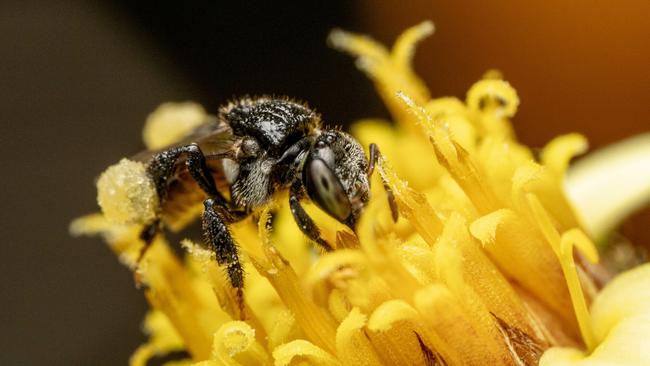JCU study reveals tropical bee species native to Townsville are at risk
Even at one degree of global warming, bees vital to the north’s rainforests and plants could be at a huge risk of decline, especially paired with insecticide exposure, a study found.

Townsville
Don't miss out on the headlines from Townsville. Followed categories will be added to My News.
Concerns are growing as one of Townsville’s native bees is at risk from insecticides.
James Cook University scientists say a common tropical bee species, the Tetragonula hockingsi, is vulnerable to widely-used insecticides which decreases their heat tolerance at the same time as the climate is warming.
23-year-old JCU PhD candidate, Holly Farnan, led the 9-month experiment and study, published this week in the journal Royal Society Open Science, making it the first study in Australia to test insecticides on stingless bees.
“I was hoping it would fill some research gaps,” Ms Farnan said.
“There’s not much knowledge about stingless bees and how they respond to insecticides and heat stress.”

Ms Farnan said bees are critical components of natural and agricultural ecosystems and concern is growing about declines in their populations.
“These declines are likely driven by a myriad of stressors including habitat loss, pathogens and parasites, competition from introduced species, poor nutrition and insecticide exposure,” said Ms Farnan.
The Tetragonula hockingsi is a small stingless bee that lives in the tropics and subtropics of Queensland and the Northern Territory and is a pollinator of both native plants and crops including mangos and lychees.
When scientists tested the bees’ response to common insecticides and heat stress they found bees exposed to insecticides for a non-lethal amount of time were more susceptible to the effects of heat.
Ms Farnan also said climate projections suggest global warming of less than 1°C will cause tropical regions to experience extreme conditions sooner than other regions of the globe.
“The combination of heat stress and insecticide exposure may put this stingless bee at increased risk of decline,” said Ms Farnan.
While she claims four similar bee species can perform the same pollination, if they were to die out it would have a huge impact on our rainforests.
“Especially plants in the canopy with very small flowers that stingless are specialists for pollinating,” Ms Farnan said.
And while Ms Farnan would like to see a decrease in the use of insecticides she says the problem is complicated when it comes to controlling pests in Australian crops.
“We can’t just stop using them but I hope it pushes for research into integrated pest programs and insecticides that are less toxic to bee species.”
Originally published as JCU study reveals tropical bee species native to Townsville are at risk


